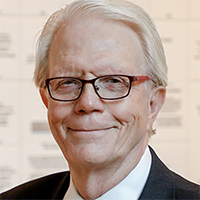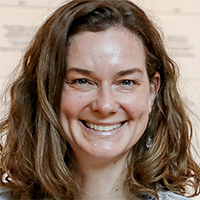What makes you get out of bed each morning to continue working on our understanding of Alzheimer’s disease and possible treatments?
Potter: Well, if we don't get out of bed and fight the good fight, it will beat us and that is an outcome that none of us want. One of the strengths of the CU Alzheimer's and Cognition Center is that we study not only Alzheimer's, which is a disease, but we also study normal cognitive aging. Understanding how the brain ages and how the body ages with the brain are essential to developing a better understanding of how we can begin to bring the brain back to normal, healthy aging when things go wrong. At the Alzheimer's and Cognition Center, we have experts with completely different training backgrounds and specialties – we bring the right people together to solve this very complex problem.
Bettcher: The sincere concern I hear in a patient’s voice and the gravity of that unknown future is something that weighs on me, and on all of us, as providers and researchers. At the end of the day, we want to change the landscape of how we age.
When looking at the landscape of Alzheimer’s drug discovery research and healthy brain aging, what stands out to you?
Potter: When I first started working in the field of Alzheimer's disease in 1985, many predicted that we would be able to announce the development of a treatment or drug that would either halt or, even better, reverse Alzheimer's disease in five to 10 years. It’s been decades and we still don't have a treatment, much less a cure. We absolutely have to solve this problem. The Alzheimer's and Cognition Center has grown over the last 10 years to really address our lack of understanding of Alzheimer's disease and our need to develop new treatments and new diagnostics. The dedication of all Center researchers is to solve this problem in collaboration with each other on campus and with our colleagues around the world.
Bettcher: As a neuropsychologist I am clinically trained as a psychologist, but I specialize in the evaluation of brain changes and how they impact thinking, memory and the ability to function. I’m most interested in finding out who’s at greater risk for developing Alzheimer’s disease and why. For example, why are some aging adults able to stave off memory decline even when they have evidence of Alzheimer's disease in the brain? I think a central piece of research needs to focus on the role of the immune system and how that impacts the onset of Alzheimer’s disease.
How does our campus ecosystem set us apart from other academic medical centers when it comes to Alzheimer’s research?
Bettcher: There’s unparalleled expertise here at CU Anschutz with respect to multidisciplinary immunology researchers. I’m very fortunate to work with a great interdisciplinary team at the Colorado Aging Brain Laboratory and I think that interdisciplinary nature is a real strength of ours. I’d be curious to know what Dr. Potter thinks of our campus’ strength in immunology.
Potter: I agree. That’s a core strength of CU Anschutz.
Bettcher: There are a lot of wonderful Alzheimer’s centers around the country, but we’ve created a real niche when it comes to collaboration. We're going to solve this problem by working together and not having a siloed approach.
Potter: In addition to the varied expertise of faculty, clinicians and students working together, the fact is that we also have the necessary pieces in one place to research normal brain aging and treat Alzheimer’s disease. All these entities are within 100 or 200 meters of each other. We can literally walk across the campus and talk to a colleague who happens to be a world expert on any aspect of normal aging or a neurodegenerative disease. Although that does occur in other centers around the world, it's very rare for it to be so physically close as we are here at CU Anschutz.
How should we be approaching Alzheimer’s research with relation to drug development and observational studies?
Potter: The essence of developing a new treatment for something like Alzheimer's disease usually starts with an idea. Through a process of elimination, many seemingly great ideas may turn out to be not as useful as we thought they were, so by the time we finish, we may have one drug or a non-drug treatment that may be worth trying in human subjects with a clinical trial.
The first clinical trial we completed for an intervention to Alzheimer's disease was with a repurposed immune-related drug called GM-CSF/Leukine®. This immune modulator resulted, for the first time, in people with Alzheimer’s disease improving in one measure of memory or cognition, as well as in some blood biomarkers of brain damage. That work was funded by philanthropy, not the NIH. Now that we have preliminary clinical results and animal results, the NIH has given us two large clinical trial grants to study GM-CSF/Leukine® and people with Alzheimer’s disease and in adults with Down syndrome who are at very great risk for developing Alzheimer’s. Without dedicated resources, all the great ideas in the world can't be tested. That’s true for our work on the Leukine® trials and for Dr. Bettcher’s longitudinal study of normal aging.
Bettcher: We get this question a lot in terms of the role observational studies play in research, and it really is a complementary approach. My primary focus with observational studies is to examine questions related to the natural history and course of aging. Given that we know neurological conditions like Alzheimer's disease begin to develop decades prior to symptom onsets, there’s been a shift to understand what is transpiring in people in their 60s and even earlier. But there’s so much we don’t yet know about the midlife point and what sets someone up on a trajectory of possible cognition decline or stability. We want to know why age is the strongest risk factor and what naturally transpires over the midlife cycle into the late-life cycle to help us better understand who’s at risk. We can learn all of that from observational studies to ultimately inform, in addition to animal studies, possible interventions
How does private philanthropy differ from traditional grants funded by the NIH?
Bettcher: We cannot do this work without research participation and support from benefactors and grant funding. However, the grant process takes a long time, and the grant may not cover the full costs of doing innovative work. We as scientists get caught in a “catch-22 cycle” of needing to show extensive preliminary data to obtain funding, but we first need funding to obtain the extensive preliminary data. If we want to break the ground on more innovative ideas and develop more sustainable frameworks for research, we need private philanthropy to help fill in the gaps.
How would philanthropy make a difference for your top priorities? What are your “shoot for the stars” dreams to advance Alzheimer’s research?
Potter: When we have sufficient funding to start projects that we couldn't dare start without the kind of long-term commitment from benefactors, it really makes a difference. Even the simplest project in a laboratory is going to take two or three years to develop. Just imagine the impact in terms of speeding up the process on an observational study or clinical trial when we have dedicated, long-term support to a program. Otherwise, we have great ideas that are going nowhere.
Bettcher: I completely agree. I think the way philanthropy can accelerate our progress and ability to implement ideas is incredible. I’m very optimistic about the reports coming out on modifiable risk for dementia. In 2020, the Lancet Commission released a report that 35% to 40% of dementias may be preventable, which is a huge percentage. However, there hasn’t been a large-scale study looking at potentially modifiable immune factors in midlife longitudinally. We also know that there are significant differences in terms of men's and women's risk for Alzheimer's disease, with women showing higher risk profiles. I think the evidence is really converging on the idea of midlife being a critical period and how some of these differential risk factors based on sex might be playing out. This could be a critical point of intervention in the future and something I would like to explore with dedicated research funding.
Guest contributor: Danielle Davis, Office of Advancement




.png)
.jpg)
